Edmund Burke (architect)
Edmund Burke (1851–1919) was a highly regarded Canadian architect best known for building Toronto's Prince Edward Viaduct or "Bloor Street Viaduct", and Toronto's Robert Simpson store. He served as the vice-president, then President of the Ontario Association of Architects.
Edmund Burke | |
|---|---|
| Born | October 31, 1851 |
| Died | January 2, 1919 (aged 68) Toronto, Ontario, Canada |
| Nationality | Canadian |
| Alma mater | Upper Canada College |
| Occupation | Architect |
| Spouse | Minnie Jane Black (m. 1881) |
| Projects | Prince Edward Viaduct |
Personal
Burke was born in Toronto to parents with ties to building industry:
- father William Burke was a local lumber merchant and builder who founded Burke, Smith & Co in 1850 (ceased operations 1967) that supplied timber to build important structures in Toronto like the Crystal Palace at the Provincial Exhibition Grounds and Gooderham and Worts Distillery)[1])
- mother Sarah Langley was sister to architect Henry Langley, whom Burke later trained with.
Education and training
Burke attended Jesse Ketchum School, Upper Canada College and Toronto Mechanics' Institute[2] before apprenticing as an architect with his maternal uncle and forming the firm Langley and Burke in 1873.
Later life and death
Most of Burke's professional career was in Toronto and he lived a little more than a decade after his uncle's death. Burke died in the city and is buried at Mount Pleasant Cemetery, where he designed the mortuary chapel in 1893.[3]
Works
| Building | Year Completed | Builder | Style | Source | Location | Image |
|---|---|---|---|---|---|---|
| St. Luke's United Church | 1874 | Henry Langley and Edmund Burke | Romanesque Revival | 15 | Sherborne Street and Carlton Street, Toronto, Ontario |  |
| St. Andrew's Evangelical Lutheran Church | 1878 | Henry Langley & Edmund Burke | Gothic Revival | 15 | 383 Jarvis Street, Toronto, Ontario | 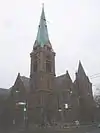 |
| Jarvis Street Baptist Church | 1878 | Henry Langley & Edmund Burke | Gothic Revival | Jarvis Street, Toronto, Ontario | 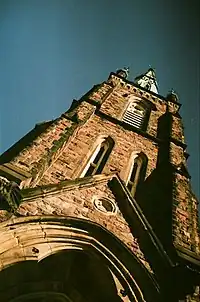 | |
| McMaster Hall | 1881 | Henry Langley, Henry Langley and Edmund Burke (Design) | Romanesque Revival | 2 | 273 Bloor Street West, Toronto, Ontario | 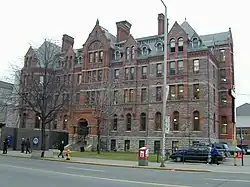 |
| Beverley Street Baptist Church | 1886 | Henry Langley & Edmund Burke | Gothic Revival | 6 | 72 Beverley Street, Toronto, Ontario | .jpg.webp) |
| Trinity-St. Paul's United Church | 1887–1889 | Henry Langley and Edmund Burke | Gothic Revival | 15 | Bloor Street west of Spadina Avenue, Toronto, Ontario | 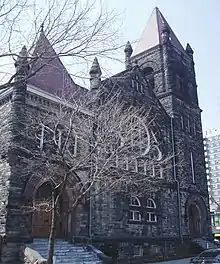 |
| Prince Edward Viaduct | 1881 | Edmund Burke | Gothic Revival | Toronto, Ontario |  | |
| Robert Simpson's Department Store Building | 1896, 1908, 1923 | Edmund Burke | Romanesque Revival, Chicago School | Toronto, Ontario | 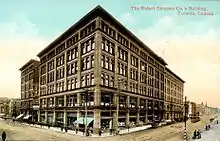 | |
| Orillia City Hall – rebuild plans for Orillia City Hall built in 1895 by Gordon & Helliwell | 1915 | Edmund Burke, J.C.B. Horwood and Murray White [4] | Romanesque Revival | 20 Mississauga Street West, Orillia, Ontario | 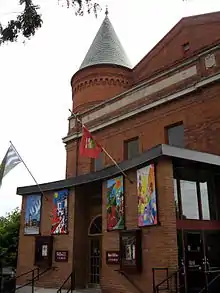 | |
| Owens Art Gallery | 1895 | Edmund Burke | Renaissance Revival | Mount Allison University, 61 York Street, Sackville, New Brunswick, Canada | ||
| Hammond/Black House (home for Fine Arts head John Hammond and now residence to the President of Mount Allison University) | 1896 | Edmund Burke | Queen Anne Revival-style | Mount Allison University, 82 York Street, Sackville, New Brunswick, Canada | ||
| Walmer Road Baptist Church | 1889–1892 | Edmund Burke & Henry Langley | Gothic Revival | 188 Lowther Street, Toronto, Canada | 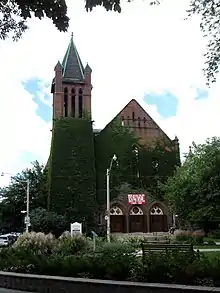 |
References
- "Archived copy" (PDF). Archived (PDF) from the original on 2016-10-06. Retrieved 2019-04-24.
{{cite web}}: CS1 maint: archived copy as title (link) - "Biography – BURKE, EDMUND (1850–1919) – Volume XIV (1911–1920) – Dictionary of Canadian Biography". Archived from the original on 2017-09-25. Retrieved 2019-04-24.
- "Biography – BURKE, EDMUND (1850–1919) – Volume XIV (1911–1920) – Dictionary of Canadian Biography". Archived from the original on 2017-09-25. Retrieved 2019-04-24.
- "Archived copy" (PDF). Archived (PDF) from the original on 2016-03-04. Retrieved 2015-01-16.
{{cite web}}: CS1 maint: archived copy as title (link)